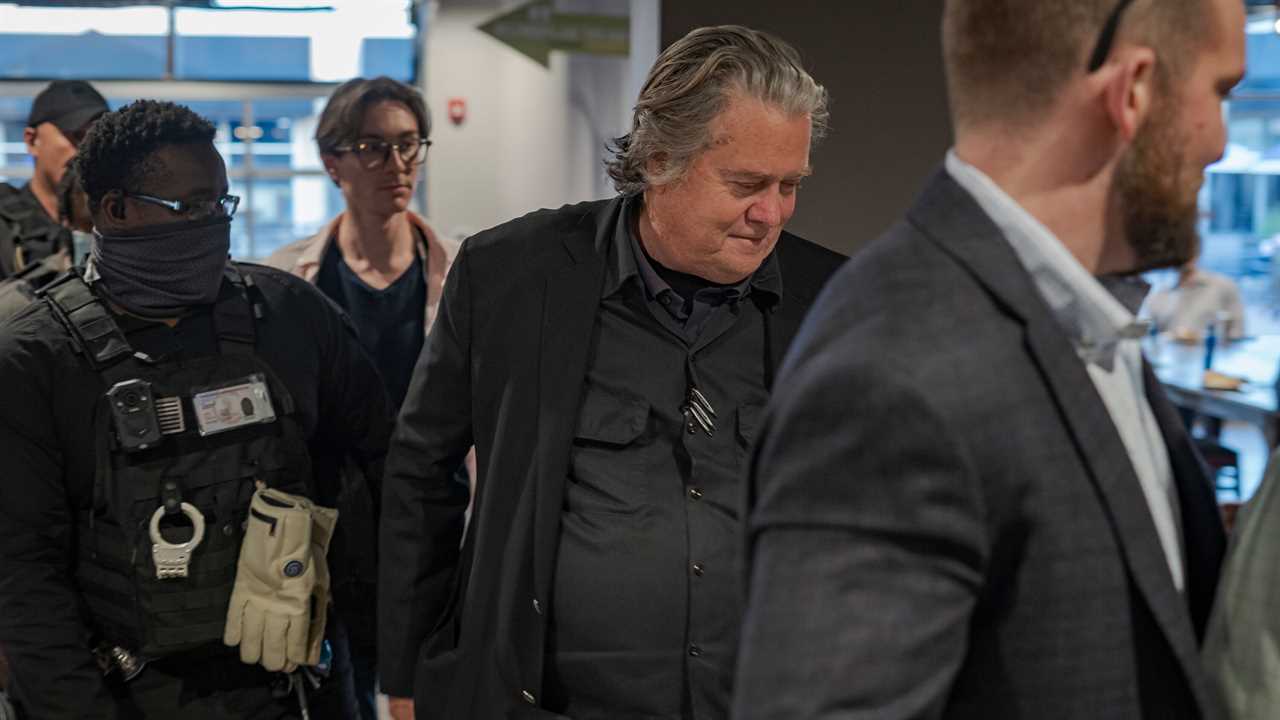
WASHINGTON — The House voted on Thursday to find Stephen K. Bannon in criminal contempt of Congress for stonewalling the investigation into the Jan. 6 Capitol attack, taking action against a close ally of former President Donald J. Trump as he and Republicans veered deeper into their efforts to justify the violence with false claims of a stolen election.The vote of 229 to 202, mostly along party lines, came after Mr. Bannon refused to comply with a subpoena from the House select committee investigating the riot, declining to provide the panel with documents and testimony. The action sent the matter to the Justice Department, which now must decide whether to prosecute Mr. Bannon, which could set off a prolonged legal fight.But what was clear on Thursday in the debate that preceded the vote was that, nine months after the deadliest attack on the Capitol in two centuries, most Republicans remain bent on whitewashing, ignoring or even validating the mob violence that took place on Jan. 6 in Mr. Trump’s name, based on his lie of election fraud.They did so seemingly at the direction of Mr. Trump himself, who in a statement hours before the vote, derided the election he lost as a crime and praised the violent mob attack on Jan. 6 — which left 140 police officers injured and claimed several lives — as a legitimate response.“The insurrection took place on November 3, Election Day,” Mr. Trump wrote. “Jan. 6 was the protest!”On the floor of the House, Representative Jim McGovern, Democrat of Massachusetts, condemned the former president’s comments.“We live in an age where apparently some put fidelity to Donald Trump over fidelity to the constitution. I find that disgusting,” Mr. McGovern said.“He is so feared,” Mr. McGovern added, “that my Republican colleagues are going to keep denying what happened that day.”The question of what will happen to Mr. Bannon will now go to the Justice Department, where Attorney General Merrick Garland has declined to say whether he will move forward with charges.“We’ll apply the facts in the law and make a decision, consistent with the principles of prosecution,” he told the House Judiciary Committee on Thursday during an oversight hearing.Mr. Biden has endorsed prosecuting those who do not cooperate with the investigation, and on Thursday, he made a point of condemning the riot and its origins.“The violent, deadly insurrection on the Capitol nine months ago — it was about white supremacy,” Mr. Biden said during a speech Thursday to commemorate the 10th anniversary of the Martin Luther King Jr. monument in Washington.Robert J. Costello, Mr. Bannon’s lawyer, has informed the committee that his client will not comply with its subpoena, citing Mr. Trump’s directive for his former aides and advisers facing subpoenas to invoke immunity and refrain from turning over documents that might be protected under executive privilege.Understand the Claim of Executive Privilege in the Jan. 6. Inquiry
Card 1 of 8A key issue yet untested.Donald Trump’s power as former president to keep information from his White House secret has become a central issue in the House’s investigation of the Jan. 6 Capitol riot. Amid a new lawsuit by Mr. Trump and a move to hold Stephen K. Bannon in contempt of Congress, here’s a breakdown of executive privilege:What is executive privilege?It is a power claimed by presidents under the Constitution to prevent the other two branches of government from gaining access to certain internal executive branch information, especially confidential communications involving the president or among his top aides.What is Trump’s claim?Former President Trump has filed a lawsuit seeking to block the disclosure of White House files related to his actions and communications surrounding the Jan. 6 Capitol riot. He argues that these matters must remain a secret as a matter of executive privilege.Is Trump’s privilege claim valid?We probably won’t know for a long time, if ever. The constitutional line between a president’s secrecy powers and Congress’s investigative authority is hazy. Historically, such disputes have usually been resolved through compromise, not judicial rulings.Is executive privilege an absolute power?No. Even a legitimate claim of executive privilege may not always prevail in court. During the Watergate scandal in 1974, the Supreme Court upheld an order requiring President Richard M. Nixon to turn over his Oval Office tapes.May ex-presidents invoke executive privilege?Yes, but courts may view their claims with less deference than those of current presidents. In 1977, the Supreme Court said Nixon could make a claim of executive privilege even though he was out of office, though the court ultimately ruled against him in the case.Is Steve Bannon covered by executiveBy: Luke Broadwater
Title: House Finds Bannon in Contempt for Defying Jan. 6 Inquiry Subpoena
Sourced From: www.nytimes.com/2021/10/21/us/politics/bannon-contempt-jan-6-subpoena.html
Published Date: Thu, 21 Oct 2021 20:33:34 +0000
Read More
Did you miss our previous article...
https://badpoliticians.com/us-politics/these-8-black-women-are-the-heads-of-some-of-americas-most-important-cities
 UK PoliticsWorld PoliticsVideosPrivacy PolicyTerms And Conditions
UK PoliticsWorld PoliticsVideosPrivacy PolicyTerms And Conditions
